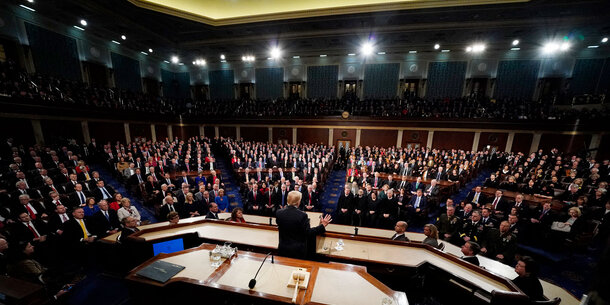A single tweet on the evening of May 3, 2016, abruptly changed the way we nominate presidential candidates. After Texas Sen. Ted Cruz withdrew from the GOP race after losing the Indiana primary, Republican National Committee Chairman Reince Priebus tweeted, “@realDonaldTrump will be presumptive @GOP nominee, we all need to unite and focus on defeating @HillaryClinton.”
Forget (if you can) Donald Trump, the 2016 candidate and president. In this case, what matters is that Priebus declared Trump the de facto nominee when the reality-show host was still nearly 200 delegates short of a convention majority. And while Cruz had indeed hoisted the white flag, then-Ohio Gov. John Kasich was still planning to fight on.
Never before in modern political history had a party chairman prematurely halted a presidential nomination fight before a candidate had corralled a convention majority.
Traditionally, losing candidates in hotly contested races had taken their quixotic fights to the convention floor, as Sen. Ted Kennedy did against Jimmy Carter in 1980. The first major exception to this rule was Hillary Clinton in 2008. Trailing Barack Obama by about 100 votes when the primaries ended, Clinton conceded the race after she lost a last-ditch fight over the allotment of delegates in the DNC’s rules committee. At the time, Clinton’s decision not to carry the struggle to the Denver convention was regarded as a major concession to party unity.
So how should a presidential nomination battle be decided?
This is neither an airy abstraction nor is it a half-forgotten artifact of 2016 Republican primaries. It is, in truth, a vital question of American democracy — and it may be as relevant for the Democrats in 2020 as it was for Republicans four years ago.
After the crackup in the 2020 Iowa caucuses and a close finish in the New Hampshire primary (with one-time frontrunner former Vice President Joe Biden finishing fifth), talk of a contested Democratic convention in Milwaukee is increasing. The latest statistical model at FiveThirtyEight estimates a 41 percent likelihood that no Democrat will have won a majority of delegates by the time the primaries end in early June.
Already, Sen. Bernie Sanders had adopted his own version of the Reince Priebus line. In an interview with Chris Hayes on MSNBC after the New Hampshire primary, Sanders said that it would be “divisive” if the convention failed to nominate the delegate leader after the primaries, even if that candidate did not have a majority. Reflecting an obviously self-serving view, Sanders asked, how could the Democrats explain that “candidate X got the most votes and won the most delegates at the primary process, but we’re not going to give him or her the nomination?”
In truth, it is difficult to predict how Democratic voters would react to the 2020 nominee emerging from a contested convention. (The traditional phrase had been a “brokered convention” until it became evident that there were no longer political bosses who could broker a second-ballot nomination for anyone in a smoke-less back room.)
A series of polls in the spring of 2016 asked GOP voters who the party should nominate if no candidate won a majority in the primaries. The answers in the national surveys were roughly the same, even though the wording of the questions varied. Typical was a mid-April NBC News/Wall Street Journal poll finding that 62 percent of Republicans believed that the convention should pick the “candidate with the most votes in the primaries,” while only 33 percent opted for the “candidate who the delegates think would be the best nominee.”
But, even though Trump’s name was not mentioned in many of these 2016 polls, GOP voters may have intuited that the entire question was about him. In this case, the implicit question would have been, “Do you want to nominate Trump or let the GOP establishment choose somebody else?” Trump’s growing support among mainstream Republican voters may have partially explained the unpopularity of the convention picking the nominee.
What is fascinating is that Democratic voters in 2016 came to a diametrically opposite conclusion.
A late April Suffolk University/USA Today poll asked Democrats, “Do you think Bernie Sanders should withdraw from the race if Hillary Clinton has clinched the Democratic nomination or should he continue his campaign to the Democratic National Convention no matter what?” By a 54-to-37-percent margin, Democrats wanted Sanders to fight to the end, which may have partly reflected the views of his die-hard supporters.
The reason it is difficult to obtain reliable polling answers about a contested convention is that few voters still remember one. The last time that a Democratic convention actually chose the nominee was probably 1952 in Chicago when Adlai Stevenson was nominated on the third ballot, although there was also uncertainty surrounding John Kennedy’s first-ballot selection in Los Angeles in 1960. Since then, conventions have become little more than TV backdrops for four-day infomercials by each political party.
Complicating everything are two other factors. The Democratic convention would be elephantine as a decision-making body, with nearly 4,000 elected delegates plus 771 superdelegates (mostly members of Congress and party officials) who could vote for president only on a second ballot and afterwards. Also, there is virtually no one still alive who understands convention nomination strategies. It is a once-common skill that has disappeared over the years like the ability to crank start a Ford Model T.
But ultimately, what choice do the Democrats have other than letting the convention choose the nominee if there is not a party-wide consensus before the delegates arrive in Milwaukee?
It is hard to argue that a leading candidate with, say, 35 percent of the delegates has an automatic claim on the nomination even though 65 percent of Democratic voters preferred someone else. And maybe, despite the potential for chaos, a contested Democratic convention could turn into the most riveting reality TV show in years.
The views expressed are the author’s own and not necessarily those of the Brennan Center.



